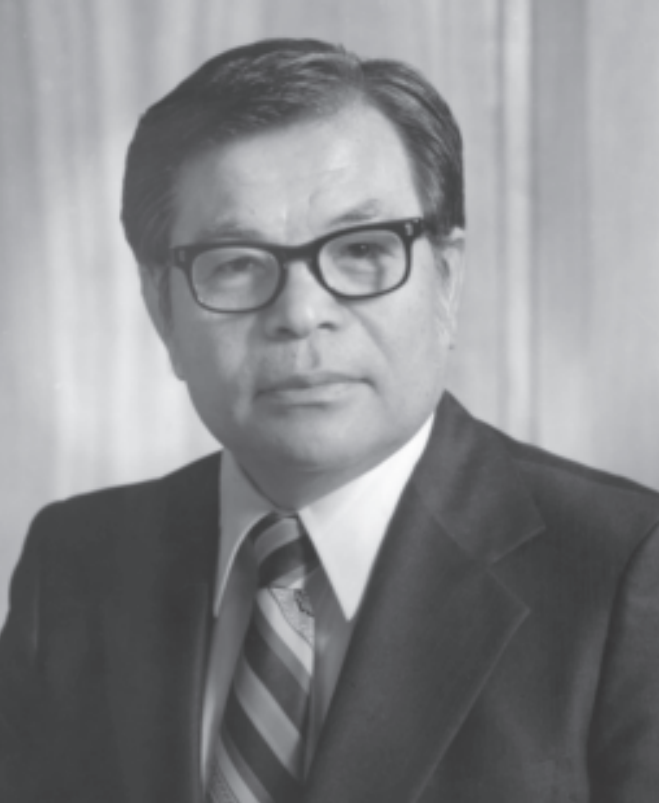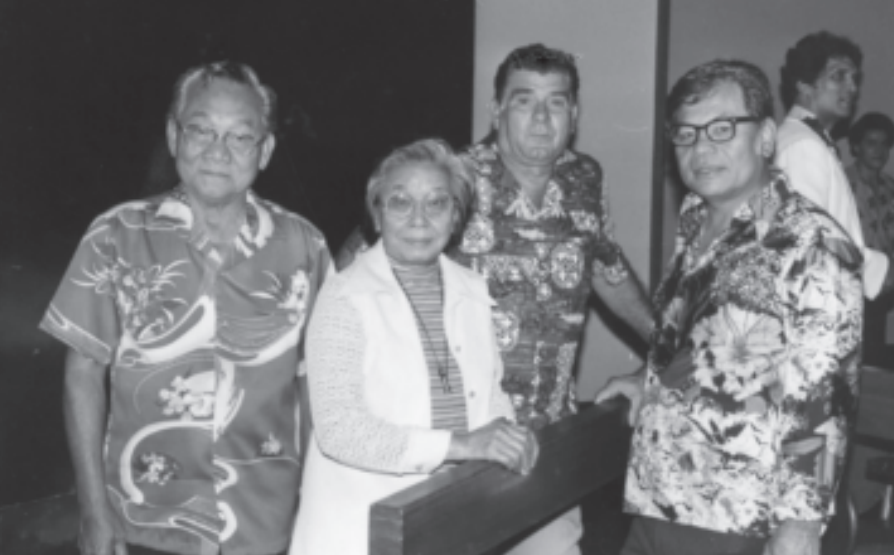
Yoshito Takamine, a stalwart in the labor movement and the Democratic Party, passed away on October 27, 2015 at the age of 89. A younger generation of ILWU members only knew Yoshito as a retiree, a member of the board of directors of the ILWU Memorial Association, and the father of former State Representative, State Senator, and Director of Labor Dwight Takamine. But they know little of his illustrious career in the ILWU and in the State Legislature as well as the leadership he provided to his union and the community.
A leader in the making
Yoshito Takamine was born in Hakalau and raised in Honokaa on the Hamakua Coast of the Big Island, the eldest son of 14 children born to immigrants from Okinawa. He knew firsthand the struggles of large families living in rural areas, who worked hard for the sugar plantation but also had to grow and raise their own food to feed their families.
Yoshito went to work for Honokaa Sugar Company fresh out of high school in 1944. In no time, he became a crane operator and a unit officer in the union, eventually becoming unit chair. During the Great Sugar Strike of 1946, Yoshito chaired the relief committee and helped to organize the workers and maintain solidarity during the arduous 79-day strike. But when the strike was settled, the gains were many—respect from management, a unified bargaining unit, a better future for workers in the sugar industry, and economic and social well-being for the entire community.
ILWU career begins
Recognized as a leader by his coworkers and others in the ILWU, Yoshito was persuaded to run for Business Agent in 1950. He won the election that year and subsequent elections until he was elected Hawaii Division Director in 1971. He served as Division Director until retirement in 1986.
As a full-time official of the ILWU, Yoshito worked with thousands of members on the Big Island and mentored many good business agents and unit leaders. Among he mentored was Eusebio “Bo” Lapenia, who became a Business Agent then Division Director and finally Local President of the ILWU. Bo gave one of several eulogies at Yoshito’s memorial service and spoke with emotion of how Yoshito developed him as a union leader and instilled in him the importance of organizing and being dedicated to the membership.
An organizer at heart
Yoshito was always an organizer. He believed in bringing people together for collective bargaining, to address community issues and needs, to elect candidates who would serve the interests of working men and women. He believed in and lived the ILWU motto, “An Injury to One is an Injury to All.” He put the interests of others ahead of his own. He was truly a man of the people.
Because of his deep roots in the community and his advocacy for labor and the working class, Yoshito was a natural to represent the Hamakua District. His supporters and the ILWU urged him to run for the Territorial House of Representatives in 1958, and he won. After statehood, Yoshito continued in the State House of Representatives until he retired in 1984, allowing his son, Dwight, to run for the position.
A legislative champion for labor
As House Labor Chair and together with labor attorney Edward Nakamura and Senator Nadao Yoshinaga, Yoshito was involved in crafting legislation that would help workers and their families— legislation like the Prepaid Health Care Act, which requires employers to provide health care benefits to their employees who work more than 20 hours a week, and the Temporary Disability Insurance law, which requires all employers to provide employees with coverage that pays them when they become ill or disabled for more than a week. Prior to enactment of these groundbreaking laws, workers often did not see a doctor because they could not afford the bill or could not stay home from work even if they were seriously ill or injured because they would not have any income.
Yoshito was also involved in passage of the collective bargaining law that allows public sector workers to unionize and worked tirelessly to protect other labor laws that provide for workers’ compensation and unemployment insurance.
An advocate for agriculture
A product of rural Big Island, Yoshito actively supported preserving and protecting agricultural lands. He served as chair of the House Agriculture Committee and, after retiring from the ILWU and the Legislature, was appointed by Governor John Waihee as Special Assistant to the Agriculture Coordinating Committee.
Yoshito fought valiantly to keep the sugar plantations operating and viable because of their economic importance to rural communities, but, one by one, they closed until today only one (HC&S on Maui) remains. When Kohala Sugar closed in 1973, Yoshito persuaded his colleagues in the Legislature to appropriate funding for the Kohala Task Force, an effort to provide funding to start up businesses that would provide jobs and economic activity in remote Kohala, which had heavily relied on Kohala Sugar.
When Hamakua Sugar and HCPC/ Mauna Kea Agribusiness closed in1994, Yoshito was already retired but his son, Dwight, worked with the Legislature and government agencies to provide funding and other programs to assist dislocated sugar workers. Yoshito’s own contribution was to promote diversified agriculture along the Hamakua Coast. He helped to secure federal funding for former sugar workers to become farmers. He organized cooperatives to help farmers work together to market their crops and share in the cost of equipment and supplies. He helped develop an incubator kitchen to turn crops into marketable products for residents and visitors alike to enjoy.
A visionary and a strategist
Yoshito was a visionary—always thinking, always coming up with new ideas, always one step ahead of others. While he sometimes could not put together the words to express his vision fully, no one would ever doubt his passion and commitment.
Yoshito never went to college, but he was an educated man. He was well-read and took notes and jotted down ideas on the yellow tablets that his children always saw him scribbling on. He was a tireless worker and, in many ways, expected the same from those around him.
Yoshito was a strategist—for the Union and in politics. He knew how to count votes, he knew what he needed to do to persuade, he knew who he could count on and who he needed to work on even more. In his own way, he was, what some might call, a “mover and a shaker.” He was able to influence others, but never for personal gain and always in the interest of working people and a better community.
A family man
Yoshito was away from home for much of his career with the Legislature and with the ILWU. Even on his home island, Yoshito would attend meetings far away and come home late at night. He readily credited his wife, Kimiko, for raising his children, but there was never any doubt that Yoshito’s heart was always with his family.
At his memorial service, Yoshito’s family shared a video presentation that they prepared for his 72nd birthday. The lessons they learned from him, the love they had for their father, and the admiration they felt for his many accomplishments were clearly expressed by all of his children. He may not have been at home for many of their events growing up, but there was no doubt that Yoshito’s family understood what a great man their father was and were proud of who he was and what he did.
And always by his side, to the end, was his wife, Kimiko, a strong woman in her own right who supported her husband through the ups and downs of union activity, political campaigns, and life. Y
Yoshito is survived by his wife, Kimiko, and their five children: Dwight (Carol) Takamine, Arlene (Bert) Hashimoto, Melanie (Rocket) Fergerstrom, Delbert (Kelcy) Takamine, and Karleen (Alan) Kaohimaunu.

ILWU Hawaii Division Director Yoshito Takamine (right) with ILWU Local President Carl Damaso, Social Worker Ah Quon McElrath, and Business Agent Herman Amaral in 1982.

